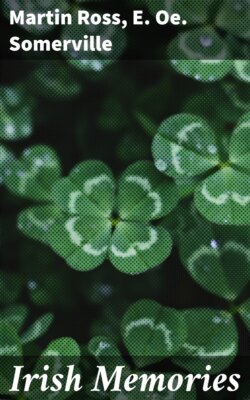Читать книгу Irish Memories - Ross Martin - Страница 17
На сайте Литреса книга снята с продажи.
CHAPTER IV
OLD FORGOTTEN THINGS
ОглавлениеTable of Contents
Chief Justice Bushe died in 1843, and Maria Edgeworth in 1849, but Mrs. Bushe lived on till 1857, a delight and an inspiration to her children and grandchildren. To her, even more than to the Chief, may be ascribed the inevitable, almost invariable turn for the Arts, in some form, frequently in all forms, that distinguishes their descendants, and to her also is attributed a quality in story-telling known as “Crampton dash,” which may be explained as an intensifying process, analogous to the swell in an organ.
But few of their grandchildren, that potent and far-reaching first cousinhood of seventy, now remain. Bushes, Plunkets, Coghills, Foxes, Franks, Harrises, they were a notable company, and I imagine that in the middle and later years of the last century they made a clan of no small power and influence. “Dublin is my washpot, over Merrion Square will I cast out my shoe,” they might have said, possibly did say, in their arrogant youth, when “The Family,” good-looking, amusing, and strenuous, “took the flure” in the Dublin society of the ’fifties. From among them came no luminary in Art, specially outstanding, yet there was scarcely one of them without some touch of that spark which is lit by a coal taken from the altar, and is, for want of a better term, called originality; and although the reputations of neither Shakespeare nor Michael Angelo were threatened, they could have provided a club dedicated to “Les Quatz’ Arts” with a very useful selection of members.
(Yet the mention of Shakespeare, and the wish to be sincere, force me to recall a tale of two of these first cousins of Martin’s mother and mine, the one an artist of delightful achievement, the other, amongst her many gifts, an astronomer and writer. The latter reproached the former for her neglect of Shakespeare, and announced her intention of reading aloud to her one of his plays. The artist replied with a high and characteristic tranquillity, “Shakespeare was a coarse man, my dear, but you may read him to me if you like. I can go into a reverie.”)
It is not out of place to mention here that the first writing in which Martin and I collaborated was a solemnly preposterous work, a dictionary of the words and phrases peculiar to our family, past and present, with derivations and definitions—the definitions being our opportunity. It might possibly—in fact I think some selections would—entertain the public, but I can confidently say it will never be offered to it; Bowdler himself would quail at the difficulties it would present.
* * * * *
Martin has, in her memoir of her brother Robert, given a sketch of life at Ross as it was in the old days, in its patriarchal simplicity, its pastoral abundance, its limitless hospitality, its feudal relations with the peasants. Its simplicity was, I imagine, of a more primitive type than can be claimed for any conditions that I can personally remember in my own country. The time of which she has written was already passing when she arrived on the scene, and she had to rely mainly on the records of her elders. The general atmosphere there and in my country was much the same, but a certain degree of sophistication may have set in a little earlier here, and when I say “here,” I speak of that fair and far-away district, the Barony of West Carbery, County Cork, the ultimate corner of the ultimate speck of Europe—Ireland. You will not find West Carbery’s name in the atlas, but Cape Clear will not be denied, and there is nothing of West Carbery west of Cape Clear, unless one counts its many sons and daughters who have gone even farther west, to the Land of the Setting Sun.
The Ireland that Martin and I knew when we were children is fast leaving us; every day some landmark is wiped out; I will try, as she has done, to recapture some of the flying memories.
To begin with
